Master the Art of Streamlining Operations with Our Top-Notch ERP Software

Introduction
In today’s dynamic business landscape, where every second counts and competition is fierce, the streamlined operation serves as the cornerstone of sustainable success. Companies strive to optimize their processes, reduce complexities, and enhance overall efficiency to gain a competitive edge. Amid this pursuit, the implementation of Enterprise Resource Planning (ERP) software emerges as a game-changer.
The Role of ERP Software in Enhancing Efficiency
At its core, ERP software acts as a comprehensive solution that integrates various business functions, from inventory and supply chain management to human resources and customer relationship management. By centralizing data and operations, ERP systems facilitate real-time information flow, enabling informed decision-making and fostering a seamless workflow.
Exploring the Key Features of Our Top-Notch ERP Software
Our cutting-edge ERP software is designed to cater to the diverse needs of modern businesses. With modules for finance, production, sales, and more, it provides a holistic view of operations, empowering organizations to make data-driven decisions. Its user-friendly interface and customizable features ensure a tailored solution for each business, promoting adaptability and scalability.
Implementing ERP Solutions: A Step-by-Step Guide
Implementing an ERP system requires meticulous planning and execution. From conducting a thorough analysis of existing processes to selecting the right software and preparing for data migration, each step demands attention to detail. A well-structured implementation strategy ensures a smooth transition and minimizes disruptions during the integration phase.
Overcoming Common Challenges in ERP Implementation
While the benefits of ERP implementation are undeniable, challenges often arise during the process. Issues such as resistance to change, data inconsistency, and technical complexities can impede the smooth functioning of operations. By fostering a culture of adaptability and providing comprehensive training, these challenges can be effectively mitigated.
The Impact of Streamlined Operations on Business Growth
A well-integrated ERP system lays the foundation for accelerated business growth. Streamlined operations lead to enhanced productivity, improved customer satisfaction, and reduced operational costs. By enabling efficient resource allocation and fostering a proactive approach to market demands, businesses can achieve sustainable expansion and establish a robust market presence.
Case Studies: Success Stories of Companies Leveraging ERP Software
Several organizations have reaped substantial benefits from the implementation of our ERP software. From small enterprises to large corporations, the seamless integration of operations has resulted in increased profitability, optimized resource utilization, and improved overall performance. These success stories serve as testaments to the transformative potential of our ERP solutions.
Enhancing Collaboration and Communication through ERP Systems
Effective communication and collaboration are vital for the seamless functioning of any organization. Our ERP software facilitates enhanced inter-departmental communication and fosters a collaborative environment, promoting synergy and teamwork. By breaking down silos and fostering a culture of transparency, it enhances overall operational efficiency and drives collective success.
Ensuring Data Security and Integrity in Operational Streamlining
The security of sensitive business data is a paramount concern in today’s digital landscape. Our ERP software incorporates robust security measures to safeguard critical information, ensuring data integrity and preventing unauthorized access. With encrypted data storage and regular security audits, businesses can mitigate the risks associated with data breaches and cyber threats.
The Future of ERP: Trends and Innovations to Look Out For
The realm of ERP continues to evolve, with emerging trends and innovations shaping the future of operational streamlining. From the integration of artificial intelligence and machine learning for predictive analysis to the adoption of cloud-based ERP solutions for enhanced accessibility, the future promises a host of transformative developments that will redefine the landscape of business operations.
How to Choose the Right ERP Software for Your Business Needs
Selecting the appropriate ERP software for your business requires a comprehensive understanding of your specific requirements and objectives. Factors such as scalability, customization, vendor support, and integration capabilities play a crucial role in determining the most suitable solution. Conducting a thorough assessment and seeking expert guidance can aid in making an informed decision.
Cost-Benefit Analysis: Understanding the ROI of ERP Implementation
While the initial investment in ERP implementation might seem substantial, the long-term benefits far outweigh the costs. Conducting a comprehensive cost-benefit analysis helps in evaluating the return on investment (ROI) and quantifying the tangible and intangible benefits derived from streamlined operations. This analysis serves as a crucial tool for decision-making and justifying the investment in ERP software.
Strategies for Seamless Integration of ERP with Existing Systems
Seamless integration with existing systems is essential for maximizing the efficacy of ERP software. Compatibility with legacy systems, data migration strategies, and the establishment of robust integration protocols are imperative for ensuring a smooth transition. A phased integration approach coupled with thorough testing minimizes disruptions and optimizes the operational efficiency of the entire system.
Ensuring User Adoption and Training for Successful ERP Implementation
User adoption is a critical factor in the success of ERP implementation. Providing comprehensive training and support to employees fosters a culture of familiarity and confidence, encouraging active participation and utilization of the ERP system. By emphasizing the benefits and simplifying the learning curve, businesses can ensure a smooth transition and promote widespread acceptance of the new system.
Tips for Maintenance and Upgradation of ERP Systems
Regular maintenance and timely upgrades are vital to ensure the optimal performance of ERP systems. Conducting routine system checks, addressing potential issues promptly, and staying abreast of the latest software updates are essential practices for sustaining the efficiency and functionality of the ERP software. Proactive maintenance measures contribute to the longevity and reliability of the system.
Conclusion
Mastering the art of streamlining operations through our top-notch ERP software is pivotal for staying ahead in today’s competitive business landscape. By leveraging the comprehensive capabilities of our solution, businesses can achieve enhanced efficiency, improved productivity, and sustainable growth. Embrace the power of streamlined operations and propel your business toward unprecedented success with our cutting-edge ERP software.
FAQs
- What are the primary benefits of implementing ERP software?
- How does ERP software contribute to improved decision-making?
- What measures can businesses take to ensure a smooth ERP implementation process?
- Is data security a concern when integrating ERP systems?
- How often should businesses consider upgrading their ERP software?
